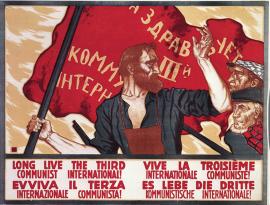Current IssueFrom the Editors
The inauguration of Donald Trump as the president of the United States opens what we fear will be one of the darkest and most dangerous periods in American history since the founding of this journal in 1961. Trump Takes Office, Resistance Takes to the Streets
Donald Trump takes office on January 20, setting up the most right-wing, racist government in modern American history, but he will not go unchallenged. That challenge is already in motion. The Rust Belt in Revolt
This year’s elections are the culmination of the long-standing economic and cultural grievances of America’s industrial workers, a subclass largely composed of white men from the Rust Belt whose factories have been asset-stripped and sent abroad and whose unions or small businesses, pensions, and prospects have been decimated. They are not the poorest of the poor—not even the poorest of the white poor. They are not from places where the economic conditions are the worst, but they are from places where uncertainty about the future of industrial jobs is most acute. "Glorious Harbinger of a New Society"The Bolshevik Revolution
One hundred years ago the most democratic revolution in history took place. Led by the Bolshevik Party, the Russian working class, allied with the peasantry and organized into mass democratic institutions—the soviets—took power. This Changed Everything—TwiceRussia, Revolution, and Counter-revolution
I
During the tumultuous years that followed the horrors of World War I, especially in the period of 1917 to the early 1920s, the Russian working class became an inspiration to workers around the world. Neoliberal Imperialism, The Latest Stage of Capitalism
One hundred years ago, in exile in Zurich during the spring of 1916, Lenin started writing one of his most important and influential works, his pamphlet on imperialism. What is the relevance of this work today? Russia and the Left
What explains the enthusiasm in certain quarters of the left for Vladimir Putin and Russia? #czarnyprotestThe Black Protest for Abortion Rights in Poland
In Poland the law on abortion is one of the most restrictive in the European Union, sex education does not exist, and contraception is both expensive and hard to obtain because a medical prescription is often needed. The Rise of the Revolutionary Left in Argentina
Night had fallen on the Atlanta Stadium in the city of Buenos Aires on November 19, and as “The Internationale” began to blare from the loudspeakers, more than twenty thousand people at the Trotskyist Left Front rally stood up, their fists held high, to sing the international workers’ anthem with a single voice. ‘Sovereignty Belongs to the People’
On December 4, 2016, the Italian electorate was asked to vote on a government-proposed constitutional reform, and the vote dealt the government and Prime Minister Matteo Renzi’s plans a ringing blow. The referendum was a political gambit on which the PM bet everything, yet 59.1 percent of voters rejected the reform. Barely an hour after the polls closed, Renzi announced his resignation. Solidarity Report from Standing Rock
[Editors’ note: The struggle at Standing Rock against the Dakota Access Pipeline (DAPL) was one of the major political mobilizations of 2016, combining the demand for Native rights with the call for environmental justice. New Politics asked Nancy Romer to cover these events for us. She was at Standing Rock from November 10-15. Remembering Martin Luther King’s Last, Most Radical Book
Marking an anniversary of a book’s publication is, appropriately, reserved for books that were widely read when they first appeared many years ago. Books we commemorate with an anniversary are ones that ushered in a new way of thinking and influenced the way society tries to make sense of the world. Martin Luther King Jr.’s last book, Where Do We Go from Here: Chaos or Community did neither of these things.1 The Rise and Fall of the Muckrakers
The Occupy movement and the Bernie Sanders campaign spotlighted once again the fact that a fairly small number of very rich people dominate the major economic and political institutions of the country. The Capitalistic Mentality and the Politics of Radical ReformA (Mostly) Friendly Reply to Michael J. Thompson
Periodization of the various versions of capitalism is tough academic work, and what follows is not meant to diminish the importance of those kinds of projects. Leonard Weinglass on The Patriot Act
The pages that follow are taken from Seth Tobocman’s new graphic biography of the radical lawyer Leonard Weinglass, Len: A Lawyer in History (AK Press). This particular section is based on a transcript of a talk that Len Weinglass gave at the 2002 Left Forum on the relationship between Nixon-era encroachments on civil liberties and the Patriot Act. 1939: Soviets Invade Poland. Defensist? Imperialist?
When the Stalin-Hitler pact triggered World War II in 1939, and Soviet troops occupied half of Poland and then invaded Finland, the Socialist Workers Party in the United States was plunged into crisis. Samir Amin’s Russian Campist Anti-Imperialism
Reflections on Opportunity LostGreece and the Syriza Experience
In very different ways, Helena Sheehan’s The Syriza Wave: Surging and Crashing with the Greek Left and Looting Greece: A New Financial Imperialism Emerges by Jack Rasmus look back over the period of the Greek debt crisis, and the parallel rise and fall of Syriza, and try to take stock. Getting Away With It: Israel and Global Occupation
At the heart of Jeff Halper’s War Against the People: Israel, the Palestinians and Global Pacification is the question “How does Israel get away with it?” In other words, how is Israel able to continually occupy Palestinian territory in contravention of international law? Sam Bottone, 1926-2016
New Politics editorial board member, socialist activist, intellectual, and labor organizer Sam Bottone, 90, died in Portland, Oregon of multiple chronic illnesses on December 30, 2016. |
Blogs & On-Line FeaturesStrategic Thinking and Organizing Resistance
The first few weeks of Donald Trump’s presidency has seen an amazing explosion of mobilizing to oppose him and his administration on oh-so-many levels. And that has been heartening. But it is not enough. Materialism and Feminism: An Interview with Johanna Brenner
George Souvlis: By way of introduction, could you explain what personal experiences strongly influenced you, both politically and academically? Johanna Brenner: I grew up in a staunchly liberal family and remained politically liberal until I joined the movement against the Vietnam war, where I was introduced to anti-imperialist politics and then Marxism and “third-camp” socialism. In the late 60’s I was part of the student left that turned toward organizing the working-class. I was a student at UCLA. We organized student support for a teamster wildcat strike and we had a group called the Student Worker Action Committee that published a newspaper, Picket Line, where we covered different worker and community struggles in Los Angeles. I was rather slow to embrace feminism, but in the 1970’s I got involved with a socialist-feminist group called CARASA (Coalition for Abortion Rights and Against Sterilization Abuse) which began in New York City. Some friends and comrades formed a Los Angeles branch of CARASA and we were able to connect to radical women of color doing community organizing around sterilization abuse in LA. From that point on, I have been deeply immersed in Marxist-feminist theory and politics. Beyond The Democratic Primary: A Reply to Daniel Moraff
In his article calling on socialists to run in Democratic primaries, Daniel Moraff argues that some of the barriers to running candidates in Democratic primaries, such as money and incumbency, also apply to third parties. So they do. He points to the fact that socialist and community organizer Debbie Medina got 40.56% of the vote in the 2016 NY State Senate race in Brooklyn’s 18th District as opposed to 13% for a Green candidate for mayor in Baltimore. So, it’s easier to run as a Democrat. Debating the Revolution
Book Review - John Riddell (editor and translator), To the Masses: Proceedings of the Third Congress of the Communist International, 1921 (Brill/Haymarket, 2016), £39.99. To the Masses is the last volume of a hugely ambitious project to make the proceedings of the (four) congresses of the Communist International held during Lenin’s time available in English. It’s an extraordinary achievement for John Riddell, a Canadian revolutionary socialist historian and activist. Organizing Against Trump: An Interview

Jason Schulman is a member of the Democratic Socialists of America, co-editor of New Politics, and author of Neoliberal Labour Governments and the Union Response (Palgrave Macmillan, 2015). He spoke to Workers’ Liberty about the challenges facing the left in America under Donald Trump's presidency.
Learning From the Great Depression
Recently, the economics editor of the Guardian newspaper in the UK, Larry Elliott, presented us with a comparison of the Great Depression of the 1930s and now. In effect, Elliott argued that the world economy was now in a similar depression as then. The 1930s depression started with a stock market crash in 1929, followed by a global banking crash and then a huge slump in output, employment and investment. In that order. The number of bank failures rose from an annual average of about 600 during the 1920s, to 1,350 in 1930 and then peaked in 1933 when 4,000 banks were suspended. Over the entire period 1930-33, one-third of all US banks failed. But it was the stock market crash that was first. We Are No Longer Scared: Non-Tenure Track Faculty at the University of Puerto Rico
The situation at the University of Puerto Rico is framed within a context of a 10-year economic depression and unsustainable debt crisis, which was meant to be remedied by the 2016 Puerto Rico Oversight Management Economic Stability Act (PROMESA), signed by President Obama, and its federal Fiscal Control Board (Junta de Control Fiscal, the word Junta in Spanish is politically charged). Similar to what was presented at the conference this weekend regarding Greece, South Africa and Mexico, the public university became, throughout the second half of the twentieth century, a vehicle by which many people have escaped poverty. Who Can You Believe About the “White Helmets”?
Recently a group called the “Hands Off Syria Coalition” disrupted a performance of Beethoven’s Ninth in Grand Central Station that was done to honor the White Helmets group. The White Helmets, of course, are Syria rescue workers of whom 140 have lost their lives while digging out victims of Syrian government and Russian bombs. Can the Young Left be Taught Old Tricks?
On the curious collaboration between the cultural left and the economic right, and how to overcome it. For all the hideous acts of Trump’s administration over the past six weeks there’s something of a silver lining to our current political moment: we’re now witnessing the emergence of what may well prove to be the most energetic and popular protest movement since the 1960s. And yet it’s worth wondering what, broadly speaking, this dissent will stand for apart from spirited opposition to Trump and his administration. Reports on the Resistance: A Day Without a Woman, For a Feminism of the 99%
As millions of women around the world held meetings and conferences, rallied and marched to celebrate International Women’s Day on March 8, many also joined an International Women’s Strike, a Day Without a Woman, that in the United States had the character of an anti-Trump movement.
Overcoming Adjunctification & Contingent Labor
The neoliberal policies implemented since the 1980s in Mexico and around the world have worsened the conditions of academic workers, imposing labor flexibility and precariousness on most of the teachers in higher education. This new academic majority needs a political revival. The reorganization of this sector has become an urgent task for academics and their unions. Western Sahara: An Albatross on African Union’s Conscience
At the twenty-eighth Summit meeting of the African Union (AU) held in Addis Ababa on 30 January 2017, Morocco’s readmission to the continental body generated heated discussion. At the end of the day the Kingdom of Morocco managed to win over sufficient member states on its side and it was allowed to join the fold unconditionally. Public Education and Teachers Unions at a Crossroads
Public education is truly at a crossroads in the US, as are both the American Federation of Teachers (AFT) and the National Education Association (NEA).
Reports on the Resistance: Rebellion in the Town Halls
On Punching Nazis
Over the past couple of weeks, social media has filled up with breathless accounts of far right leaders having gotten their comeuppance by being physically assaulted or, in a recent case, murdered in an act of domestic violence. |
















 For some time now, many of us have wondered how it is that a number of left-wing writers and some political organizations could support Vladimir Putin and the Russian government’s role in international affairs.
For some time now, many of us have wondered how it is that a number of left-wing writers and some political organizations could support Vladimir Putin and the Russian government’s role in international affairs.














 Thousands of people showed up at town halls meetings across the United States in February to challenge Republican congressional representatives and senators on their plans for the Affordable Care Act (Obamacare) as well as on issues from immigration, to the environment, to President Donald Trump’s relations with Russia. While this past week fewer protestors took to the streets where radicals have generally taken the initiative and established the tone of the Resistance, town halls swelled with more moderate but quite militant crowds who challenged Republicans and their politics.
Thousands of people showed up at town halls meetings across the United States in February to challenge Republican congressional representatives and senators on their plans for the Affordable Care Act (Obamacare) as well as on issues from immigration, to the environment, to President Donald Trump’s relations with Russia. While this past week fewer protestors took to the streets where radicals have generally taken the initiative and established the tone of the Resistance, town halls swelled with more moderate but quite militant crowds who challenged Republicans and their politics.


 This essay was originally a talk at the conference held at the New School for Social Research on April 21-22, 2016.
This essay was originally a talk at the conference held at the New School for Social Research on April 21-22, 2016.

 Rosa Luxemburg’s defense of socialist democracy and her critique of the Bolsheviks in her pamphlet The Russian Revolution (1918) are well known. Less well known and often forgotten is her critique of bourgeois democracy, its limits, its contradictions, and its narrow and partial character. We propose to examine this critical line of thought in some of her political writings without any pretentions to completeness.
Rosa Luxemburg’s defense of socialist democracy and her critique of the Bolsheviks in her pamphlet The Russian Revolution (1918) are well known. Less well known and often forgotten is her critique of bourgeois democracy, its limits, its contradictions, and its narrow and partial character. We propose to examine this critical line of thought in some of her political writings without any pretentions to completeness.